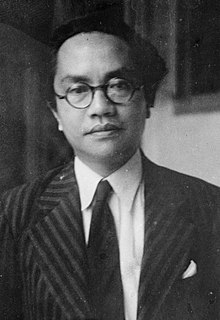Amir Sjarifuddin | |
|---|---|
 Portrait of Amir, c. 1947 | |
| 2nd Prime Minister of Indonesia | |
| In office 3 July 1947 – 29 January 1948 | |
| President | Sukarno |
| Deputy |
|
| Preceded by | Sutan Sjahrir |
| Succeeded by | Mohammad Hatta |
| 2nd Minister of Defense | |
| In office 14 November 1945 – 29 January 1948 | |
| President | Sukarno |
| Prime Minister |
|
| Preceded by |
|
| Succeeded by |
|
| 1st Minister of Information | |
| In office 2 September 1945 – 12 March 1946 | |
| President | Sukarno |
| Prime Minister | Sutan Sjahrir |
| Preceded by | Office established |
| Succeeded by | Mohammad Natsir |
| Personal details | |
| Born | Amir Sjarifoeddin Harahap 27 April 1907 Medan, Sumatra's East Coast, Dutch East Indies |
| Died | 19 December 1948 (aged 41) Karanganyar, Indonesia |
| Cause of death | Execution by shooting |
| Resting place | Ngaliyan Public Cemetery |
| Political party | PSI |
| Other political affiliations | |
| Spouse |
Djaenah Harahap (m. 1935) |
| Alma mater | Rechts Hogeschool (Mr.) |
| Occupation |
|
Amir Sjarifuddin Harahap (EVO: Amir Sjarifoeddin Harahap; 27 April 1907 – 19 December 1948) was an Indonesian politician and journalist who served as the second prime minister of Indonesia from 1947 until 1948. A major leader of the left wing during the Indonesian National Revolution, he previously served as Minister of Information from 1945 until 1946 and Minister of Defense from 1945 until 1948. Amir was born into the Sumatran aristocracy and was educated at Leiden University. At Leiden, he became a member of the board of the Gymnasium student association in Haarlem and was involved in the Batak student organization Jong Batak. He returned to Indonesia due to family troubles but continued his education at the Rechts Hogeschool in Batavia.
After graduating, he became active in literary and journalist circles, joining the editorial board of the newspaper Panorama. He also became involved with left-wing politics and led a group of younger Marxists in the establishment of the Indonesian People's Movement (Gerindo). In 1933, due to his political activities, Amir was imprisoned, and almost exiled to the Boven-Digoel concentration camp, had it not for the efforts of his cousin and teacher. During the Japanese occupation of the Dutch East Indies, Amir was one of a few prominent Indonesian politicians who actively fought against the Japanese, together with fellow future prime minister Sutan Sjahrir. Following the Proclamation of Indonesian Independence, he was appointed Minister of Information in President Sukarno's Presidential Cabinet. Later, he was appointed the Minister of Defense following the absence of Supriyadi.
After the fall of Sjahrir's cabinet, Amir was chosen to head the new cabinet, with the backing of a broad coalition. He faced a backlash over the cabinet's decision to ratify the Renville Agreement, and he resigned from the prime ministership, being succeeded by Vice President Mohammad Hatta as prime minister. After his ousting, he became involved in the People's Democratic Front (FDR). Following the beginning of the Madiun Affair, Amir and other FDR leaders rushed to assume control of the newly formed "National Front" government. In the following weeks, pro-government forces, led by the Siliwangi Division, began pushing the leftist forces back. During the fighting, Amir was captured, and imprisoned in Yogyakarta. After the withdrawal of Republican forces after Operation Kraai, he was executed, along with fifty other leftist prisoners.